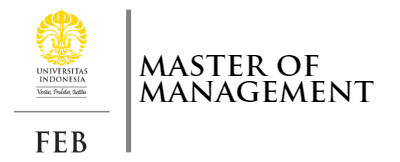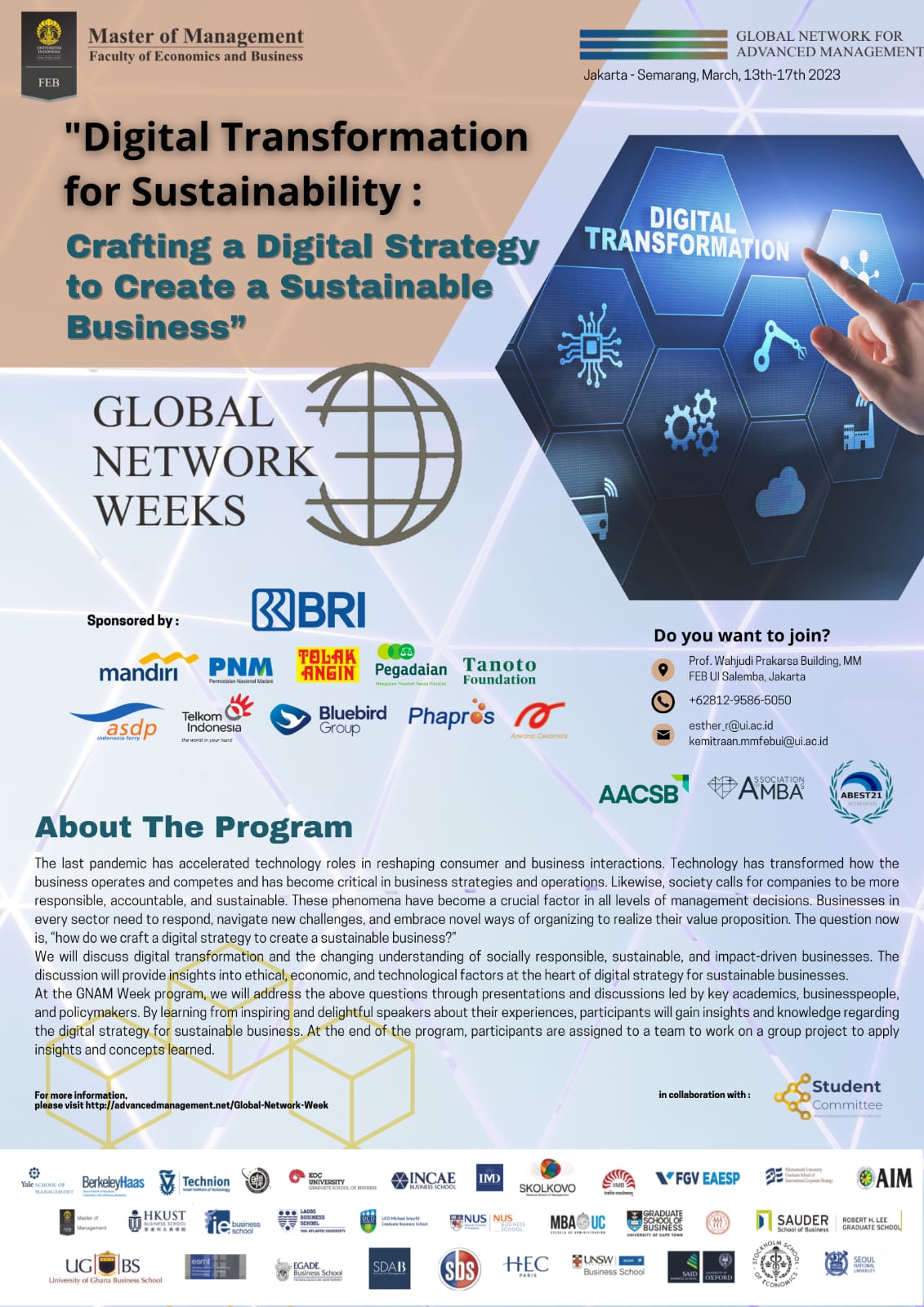GNAM Week Universitas Indonesia 2nd Day:
Company Visit to BRI, the Biggest Bank in Indonesia and the National Leader Telecommunication Company PT Telkom Indonesia
1st lecture from second day GNAM Week Day 2: Accelerating Digital Economy to Boost Financial Inclusion and Economic Growth

The second day of the GNAM Week program was filled with a presentation session from PT. Bank Rakyat Indonesia Tbk. Mr. Arga M. Nugraha, the Director of Digital and Information of PT. Bank Rakyat Indonesia Tbk opened the session by warmly welcoming the attendee.
Before we proceeded to the main session, Mr. Arga M. Nugraha mentioned that Bank Rakyat Indonesia, or BRI, is one of Indonesia’s oldest and largest banks. BRI focuses on microfinance. This focus makes them at the forefront of microfinance in Indonesia. BRI also has the most prominent customers worldwide, along with their other entities named PNM, with 9 million customers, and Pegadaian, with 3 million customers.
Mr. Nugraha also said digitalization had greatly helped BRI, especially during global challenges such as the pandemic. He mentioned that BRI’s customers have shifted from branch-based transactions to digital channels. The number steadily rises, aligning with the customer’s digital transformation journey. So far, BRI’s transactions are split into two types of transactions, with 98,41% from digital channels and 1,59% from branch-based transactions.
BRI is fully committed to bringing its conventional customers into the digital era with care. Mr. Nurgraha said their customers don’t land easily in the digital era. The main reason is the risks they must take to shift to digitalization. This reason drives BRI to constantly educate its customers about the risks and benefits of moving to the digital era.

Later, the main session was moderated by Triana Rahajeng Hadiprawoto, Ph.D., one of the lecturers from Universitas Indonesia. The speaker for the session is Mrs. Sinta Indriyaty Thio, the Head of the IT Strategy and Governance Division. Mrs. Thio mentioned that BRI is the largest microfinance institution in the world. BRI also has a dedicated research facility just for microfinance. BRI is the only bank in the world that owns a satellite. BRI has consistently made achievements over the years. BRI marked the highest profit growth compared to other companies in Indonesia. BRI was number one listed in Forbes’s largest public companies, Global 2000 World’s Forbes 2022.
Economic processes are being increasingly digitalized. The pandemic is regarded as digitalization’s “boom” period. With a 54% YoY increase, e-commerce is still Indonesia’s key development engine. Also, the pandemic created a chance for EdTech and Health Tech platforms. More than ever, consumers and SMEs are utilizing digital financial services like insurance, lending, investing, and payment.
Moreover, the pandemic opened new business opportunities such as remote working, partnerships, and M&A with fintech, banks, and digital platforms. Also, Mrs. Thio noted that clients today are more demanding. Because they are unable to move around freely, everything must be instantaneous. Thus, digital ought to meet client requests and needs.
BRI can offer its users a distinctive experience by combining its substantial physical footprint and digital capabilities. Three digital skills are present in BRI. Digitizing Core is the first that BRI digitizes its current services and transactions (business process) to increase productivity and unlock potential. Digital Ecosystem is the second. To take advantage of fresh liquidity, new opportunities, and new sources of growth, they sell goods and services outside of their primary business. New Digital Propositions come last. To reach an underserved market and get ingrained in the lives of its customers, BRI founded and launched an independent greenfield digital bank.
2nd Lecture: Journeys to the future: Digital Transformation in Telecom.
In the second lecture, all participants visited PT Telkom Indonesia at Telkom Landmark Tower. We’re given a warm welcome by Mrs./Ms. Widi Wibowo as Portfolio Manager of Indigo, Telkom. Joining us in the audience were Mr. Daniel Tumpal Hamonangan Aruan S.Si., M.S.M., PhD. as Lecturer of the University of Indonesia, and Vice deputy head of the Master of Management department, Mr. Arviansyah, S.E., M.Sc., Ph.D.

Mrs./Ms. Widi elaborated that the lecture would be divided into two sessions: 1) Introducing Indigo Program and sharing session with Indigo Alumni, 2) Digital Transformation of Telecom Indonesia told by Mr. Dwi Widodo H.K as the AVP Digital Business Planning and Governance of PT Telkom Indonesia (Persero) Tbk. Starting the session, Mrs./Ms. Widi explained about Indigo Telkom, an incubator and accelerator program in Indonesia managed by Telkom. Indigo fosters start-ups by creating various programs ranging from start-up establishment to growth and helping them through a synergy process to create the best start-up for the Nation. It was founded in 2009 and had 206 start-ups incubated by them.
The program consists of two main activities: incubating and accelerating the development of that start-up from finding the idea that corresponds to problems faced by customers, finding the right customer, generating their first revenue from their business model, and generating more revenues and users. One of the benefits of joining the Indigo program is start-ups would get funded by Indigo in an instrument of “Convertible Notes” or loans. If they succeed, Indigo will convert their CN into shares, which would be managed by Telkom subsidiaries. Besides the regular portfolio, Indigo has a specific incubator portfolio for Games Start-Up. It is specified because Games Start-Up has difficulty finding content and publishing for commercialization. Moving on from the Indigo program, she introduced us to two start-up companies that Indigo has. In the incubation process, they’re; 1) Educourse.id and 2) Tebengan.
Joining us on stage was Mrs./Ms. Mutiara Hikma Mahendratta, BBA, MBA or Mba Muti for short as the CEO and founder of Educourse.id, said that the main problem in Indonesia’s education system is the huge gap between the system and the students itself, followed by the accessibility of good education. Educourse.id is a STEM-based education platform that prepares future skills based on 4.0 needs. They design and implement STEM-based curricula, enhanced with AR, AI, and IoT technology experiences technology for K-12 and vocational students, delivering the solutions for those problems. Educourse.id gain revenue mainly by utilizing the B2B business model, followed by the B2C business model. Educourse.id joined Indigo Program during the stage of Acceleration Program, working on market validation which was the highest stage ever for a start-up to join Indigo.
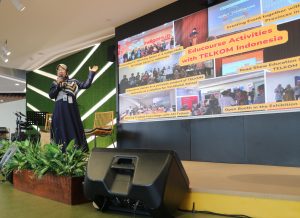
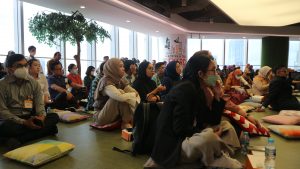
The next start-up that Indigo would like to show us is Tebengan, or in English, we could say “Hitch-hiking,” a start-up that just joined Indigo a day before the GNAM Week UI visit. Tebengan, as explained more by William Widjaja, the CEO and Founder of Tebengan, is a start-up offering solutions for those who live in the sub-urban and need to commute to work in the city. Tebengan serves a solution in the form of a door-to-door smart shared shuttle that groups passengers sharing a ride, powered with an algorithm for smart clustering and route optimization. So, sharing rides will be much cheaper and less tiring than driving their own vehicle through traffic, which can lead to less productivity at work. Tebengan was established in 2018 and launched a marketplace for empty seats. In 2021, Tebengan needed to transform its business model into a contract-based driver to determine its fee. In addition, they control the vaccination status and vehicle condition due to COVID-19 adjusting people’s behavior. Those adjustments worked and made their business grow to the point that they reached gross profitability in 2023.
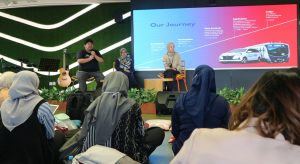
More information was revealed in the Q&A Session with Mrs./Ms. Widi, Mba Muti, and Mr. William discussed their challenges during the incubator and acceleration program with Indigo. The different start-ups had other challenges. Educourse.id was challenged in performing by meeting the bare minimum and beyond the key performance indicator that Indigo set for them. At the same time, Tebengan needed to focus on building and maintaining a business model as they needed to strengthen their B2C to gain more users, thus, more revenue.
Questions for Indigo revolved around who could join the program and what requirements were needed. As an incubator and accelerator program by a state-owned company enterprise, they encourage all Indonesian youth to create a digitalized product to answer people’s problems. So, anyone interested in joining Indigo must have a CEO or Found/Co-Founded by Indonesian Nationality. The entry-level can be at the pre-start-up, incubation, or acceleration stage, depending on the company state. Indigo can assist up to two years for the start-up to grow and succeed.
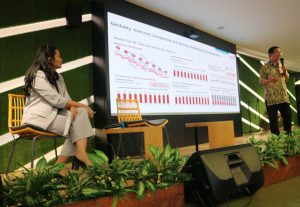
Later on, the main lecture was moderated by Triana Rahajeng Hadiprawoto, Ph.D. discussing “Journeys to the future: Digital Transformation in Telecom” told by Mr. Dwi Widodo H.K. As the AVP Digital Business Planning and Governance of PT Telkom Indonesia (Persero) Tbk., Mr. Widodo responsibility was to provide a strategy for Telkom to go digital and governance as how running an IT business while still complying with the government regulations. Telkom is urgently required to perform a digital transformation as the only state-owned enterprise running the IT industry.
There were six problems that the Telkom industry faced: 1. pricing is slowing down because they become a daily program instead of premium things, 2. they are struggling to grow their revenue, and 3. stagnant profitability. Telkom used to have more than 40% profitability, but they can only get 10-20% now. 4. Increasing Capex Investments to support the digitalization program, 5. Limited Potential Valuation Upside. Lastly, 6. Decrease in the human capital market vs. tech people who actually qualified. There’re 12 activities that Telkom does to digitalize itself. Telkom still faces other challenges, such as geopolitical tension, inflation, fed interest rate adjustment pandemic, which affects market valuation correction, start-up efficiency, IPO market slowed, etc. The pandemic’s silver lining is the acceleration of digital adoption, which creates a market to be offered by digital businesses. Even though transformation isn’t easy, Telkom still needs and will continue improving to keep up with the evolution of IT.
